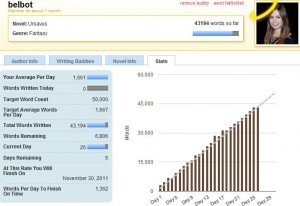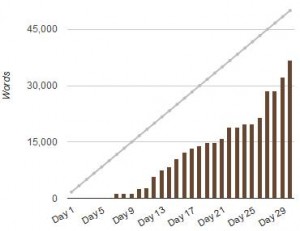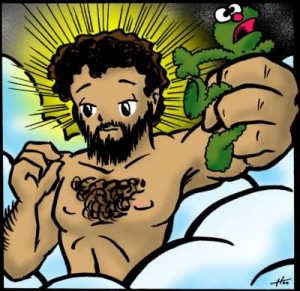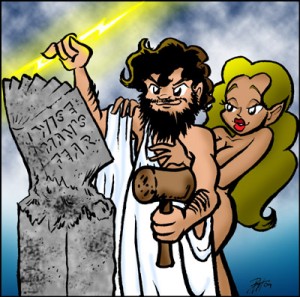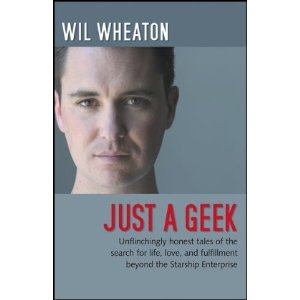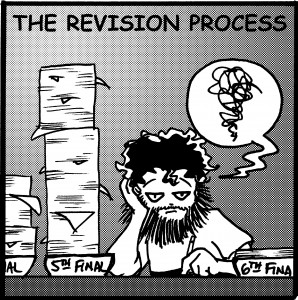So last month I got all riled up and decided to try NaNoWriMo.
I walked into the experience full of hubris. Despite the fact that I was starting a week late, I was sure I’d be able to stride in, thunder forth 50,000 words, then still have time to make a delicious sandwich, invent a perpetual motion machine, and wrestle a bear before the end of November.
After all, I thought to myself. Am I not a published author? Have I not published over half a million words of fiction? Am I not, in fact, Patrick Rothfuss, international bestselling author, polymath, iconoclast, and haptodysphorian despoiler of women?
In the heat of the moment I forgot that in addition to being those things, I am Pat Rothfuss, who took fourteen years to publish his first book, and four to publish his second. And while *Patrick* Rothfuss looks pretty good on paper, *Pat* Rothfuss is, at his heart, something of a slacker, a dabbler, and a hooligan. What’s more, I am prone to obsessive revision and a certain degree of linguistic faffery.
So let’s jump straight to the ending of the story. Did I win NaNoWriMo?
Well, there are two answers to that.
If by “win” you mean “did you manage to write 50,000 words by the end of the month?” then the answer is a resounding, “no.”
Not only did I not write 50,000 words, but I broke pretty much all NaNoWriMo’s rules from the very beginning.
You’re supposed to start a novel and stick with that project all the way through the month. You’re supposed to move ever-forward, never looking back, never stopping to revise.
I did none of these things. This is in part because I am a contrary person. (See above, under iconoclast.) But it’s also because I prefer to adhere to the spirit of the law rather than the letter of it. And to me, the spirit of NaNoWriMo is writing 50,000 words.
This I did not do. I was short by about 15,000 words. So no matter if you’re looking at the spirit or the letter of the law, I’m a loser.
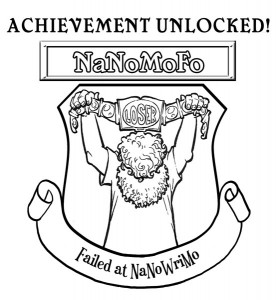 (Woo! NaNoWriMo Losers Unite!)
(Woo! NaNoWriMo Losers Unite!)
Despite the fact that I failed to hit the 50,000 mark. I consider the experience to be a huge success. Why?
- I had fun.
Writing is usually a very isolationist activity. Heading onto the NaNoWriMo website every day and seeing how other folks were doing make writing just a *tiny* bit social. Sure, I was spending hours alone in a room, but I was spending all that time alone with other people. If that makes any sense to you.
For example, I found out fairly early that Veronica Belmont was taking her first run at a novel this year. So I wandered over and looked at her stats.
Specifically, here’s the graph that charts how many words she’s written every day: 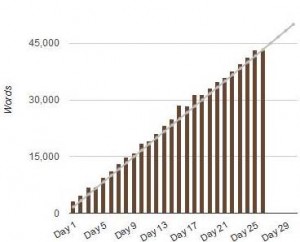
See her powerful lines? See how she’s been on track since day one?
That means she’s been writing the 1,667 words you need to produce every day to reach 50,000 by the end of the month.
By comparison, let’s look at my graph:
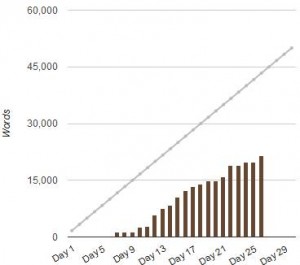 (Imagine a sad, cartoony trombone noise here. Wah-wah…)
(Imagine a sad, cartoony trombone noise here. Wah-wah…)
Now I *did* start a week late. But even so, you have to admit that my graph looks…. um…. sad. One might even call it “wretched” or “sickly.” A particularly scathing person might even use the word, “flaccid.”
I wouldn’t use that word, mind you. But someone might.
When I contacted Veronica to see if she was okay with me using her stats in my upcoming blog, she said something along the lines of, “No problem. Thanks for reminding me I need to get my writing done for the day. I should really quit playing Skyrim…”
Her offhand comment filled me with a burning shame and fury. She was beating my ass AND PLAYING SKYRIM AT THE SAME TIME?
Fueled by shame, I wrote 15,000 words over the next four days.
It wasn’t enough for me to hit 50,000 words. But it was enough so I could end the month with my head held high.
So not only was it fun. It was motivating as well.
- I got a lot of writing done.
No matter how you slice it, I got 35,000 words in three weeks.
I made serious headway on one project that I’ve been putting off for a while, got a start on another, and finished a third one entirely.
It’s a good feeling, getting those smaller projects done. And as an added bonus, it means y’all are going to be seeing some other stories in the next year while I’m still slogging away on book three.
- I learned a lot.
Around the 10th day I found myself thinking things like:
I wrote 700 words today when I was answering fanmail. That counts as writing, right?
To which I had to reply to myself: No. It’s not really writing.
What about the e-mail that I wrote to my editor and agent? That counts as writing, right?
No. You *are* typing words, and it’s part of your job. But it’s not getting work done on a publishable story.
What about the questions I answered on my translator forum?
Ummmm. No. Doesn’t count. It’s not producing new material.
What about the thousand-word blog I wrote? That’s a story. Kinda. And it’s new material.
No. Shut up. Shut up and write.
Ultimately, it made me come to grips with a platonic truth: Only real writing is writing.
Other stuff I learned:
- I don’t need a big chunk of time to get good writing done.
Normally I like to have 3-4 hours free to write. But just 30 minutes can be productive if I knuckle down hard.
- You can always find a reason *not* to write.
Sometimes they’re big reasons. You want to spend time with your adorable baby. You have to take a business trip. Maybe you’re trying to get your awesome yearly fundraiser organized.
But y’know, there’s always going to be something going on. You’re tired. You’ve got a sniffle. Your roommate is being a choad. Your girlfriend wants to make out. You just discovered a cool tower defense game….
You can either let those things stop you from writing, or you can write. It’s that simple.
- I can write 1000 words in an hour.
On one memorable day, I sat down knowing that I had to meet Sarah soon. In the hour that I had to work, I wrote a thousand words. It felt pretty awesome.
Later that day I came back to the computer and worked on revising the story. I worked for 3 hours and by the end of I was only up about 250 words.
I don’t regret taking the time for revision. Wordcount may be impressive, but revision is vital for a good story. Those 250 words were really important.
- I learned I can write an entire story in a single sitting.
(This was, by far, the coolest part of NaNoWriMo for me.)
It was the last day of November, and I had painted myself into a corner. I hadn’t been good about writing my daily 1667 words, and I was paying for it. I was only at 32,000 words for the month, and feeling rather ashamed.
I wrote late into the night, then slept in my office. I woke up about seven hours later and sat right back down in front of the computer again.
I opened the story I’d been doing most of my work on over the month, (it’s a novella, set in my world). That’s when I remembered a little idea I’d had the day before when I was walking home.
The idea tickled at me. So rather than potentially forget it, I opened a new file and jotted it down. I jotted down the first line of the story, too. And the first couple of sentences.
Then I finished up the introductory scene. Then I did the second scene too, because it was short, and it was obvious in my head.
And since things were going well, I did another scene. And then I saw how the middle should go. And I was having fun, and it was turning out pretty cool, so I jumped in and started writing that too….
I knew I should be getting back to my novella so I could blaze some trail. I wasn’t going to get a lot of words out of my new story. It was stylistic, the POV was odd, and the language was very lean. But it was turning out really good….
After I finished the middle, I realized it would be stupid for me to do anything other than press on until the end. Because I knew exactly where it was going.
So I finished it. Beginning to end, it took me seven and a half hours. I was exhausted and excited. I’d never done anything like that before.
That final day sort of summed up my entire NaNoWriMo experience. Technically, I failed because I didn’t churn out a huge number of words. But realistically, I rang the bell hard and won the fuzzy pink elephant.
And you want to know the funny part?
You want to know the final wordcount on the story?
1667 words.
No kidding.

